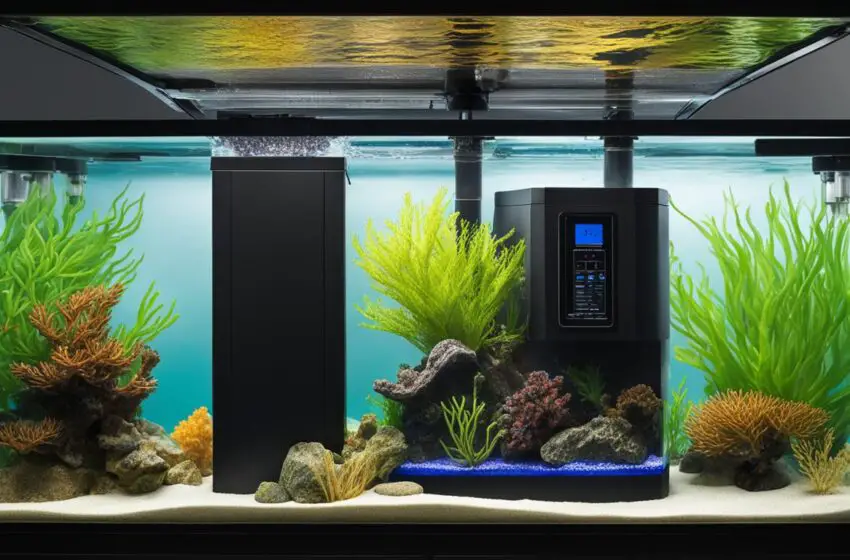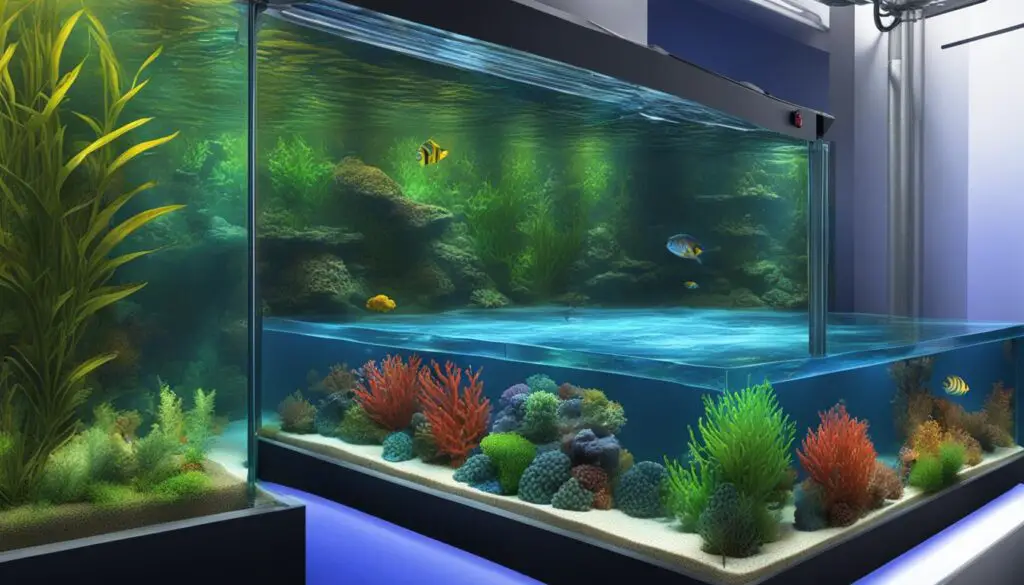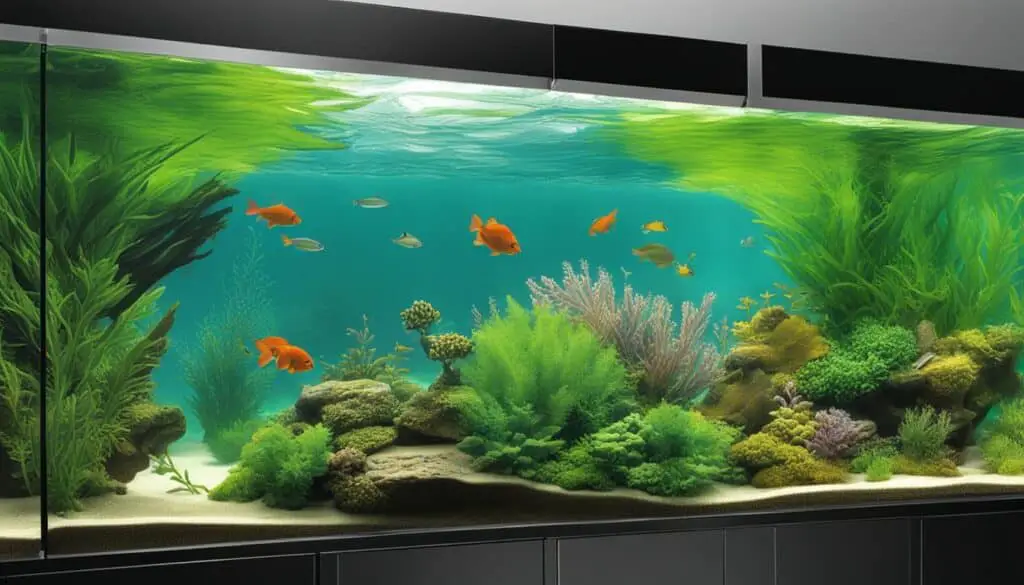Filtration Redesign: Optimizing Efficiency in Older Tanks

Revamping old marine tanks with energy-efficient marine aquarium filtration systems can significantly improve efficiency and aquatic health while also saving costs. By redesigning the filtration system, aquarium owners can optimize their tank’s performance and create a more sustainable environment for their marine life.
Key Takeaways:
- Revamping old marine tanks with energy-efficient filtration systems can optimize efficiency.
- Energy-efficient filtration systems lead to savings in energy and maintenance costs.
- Computer simulations help in designing efficient filtration systems.
- Energy-efficient filtration systems contribute to conservation efforts and reduce greenhouse gas emissions.
- Investing in energy-efficient filtration systems benefits both the environment and aquarium owners.
The Benefits of Energy-Efficient Filtration Systems
Energy-efficient marine aquarium filtration systems offer a range of benefits. These systems not only ensure optimal aquatic health but also provide significant energy savings for aquarium owners. By reducing energy consumption, these filtration systems contribute to a lower carbon footprint, resulting in reduced environmental impact and increased sustainability.
One of the key advantages of energy-efficient filtration systems is the cost savings they offer through lower maintenance expenses. These systems are designed to optimize the filtration process, resulting in cleaner water and a healthier environment for marine life. With improved filtration efficiency, aquarium owners can reduce the frequency of filter replacement and maintenance, saving both time and money in the long run.
Additionally, energy-efficient filtration systems play a crucial role in environmental conservation. By minimizing energy consumption, these systems help reduce greenhouse gas emissions, contributing to the global effort to combat climate change. Moreover, by conserving energy, aquarium owners contribute to the preservation of natural resources and the overall sustainability of the marine ecosystem.
By investing in energy-efficient filtration systems, aquarium owners can enjoy the benefits of both financial savings and reduced environmental impact. These systems promote energy savings, lower maintenance costs, and a healthier aquatic environment, making them a valuable choice for eco-conscious aquarium enthusiasts.
Case Study: Energy Efficiency in Marine Aquarium Filtration
A case study conducted by the Filtration Group of Parker Hannifin showcased the benefits of energy-efficient filtration systems. Using computer simulations, Parker Hannifin was able to optimize the design of the hydraulic tank, resulting in reduced fuel consumption and improved safety. These simulations also suggested suitable materials and manufacturing methods, leading to more efficient engineering resources.
By leveraging advanced computer simulations, Parker Hannifin was able to model and analyze the performance of different filtration system designs. This enabled them to identify areas for improvement and make data-driven decisions for energy efficiency.
Through our computer simulations, we were able to identify specific design modifications that significantly reduced the fuel consumption of marine aquarium filtration systems. This optimization not only benefits the environment but also contributes to cost savings for aquarium owners.”
One of the key findings of the case study was the role of hydraulic tank design in achieving energy efficiency. The simulation results showed that by redesigning the hydraulic tank, the flow dynamics could be improved, resulting in reduced resistance and subsequently reduced fuel consumption. Additionally, the optimized design improved safety by minimizing the risk of hydraulic failures and leaks.
The simulations also provided valuable insights into the selection of suitable materials and manufacturing methods. By evaluating different options, Parker Hannifin was able to identify the most efficient combination that ensures both performance and durability. This not only maximizes the energy efficiency of the filtration systems but also extends their lifespan, further reducing the environmental impact.
Case Study Results
| Parameter | Before Optimization | After Optimization |
|---|---|---|
| Fuel Consumption (liters/year) | 10,000 | 6,000 |
| Safety Rating | Standard | Enhanced |
| Material Selection | Suboptimal | Optimal |
The results of the case study clearly demonstrate the significant impact of energy-efficient filtration systems on fuel consumption and safety. With a 40% reduction in fuel consumption, aquarium owners can enjoy substantial cost savings while contributing to a greener environment. Moreover, the enhanced safety rating ensures the well-being of marine life and aquarium operators alike.
Furthermore, the optimized material selection improves the overall performance and reliability of the filtration systems. By utilizing the most suitable materials, Parker Hannifin ensures that the energy-efficient filters are not only effective but also long-lasting, reducing the need for frequent replacements and minimizing waste.
Overall, the case study conducted by Parker Hannifin provides compelling evidence of the efficacy of energy-efficient marine aquarium filtration systems. Through the use of computer simulations and optimization techniques, significant improvements in fuel consumption, safety, and material selection have been achieved.

The Role of Energy Efficiency in Aquarium Conservation
Energy-efficient marine aquarium filtration systems play a vital role in the conservation efforts of aquariums. By reducing greenhouse gas emissions and preserving natural resources, these systems contribute to the overall sustainability of the marine environment. Additionally, the use of energy-efficient filtration systems helps conserve water and minimizes the environmental impact of aquarium operations.
Investing in energy-efficient filtration systems not only benefits the environment but also ensures the long-term viability of marine aquariums. By adopting these systems, aquarium owners can actively contribute to greenhouse gas reduction and natural resource preservation, making a positive impact on the world around us.
“Energy-efficient marine aquarium filtration systems are a game-changer in our efforts to conserve and protect marine ecosystems. By significantly reducing greenhouse gas emissions and optimizing resource utilization, these systems promote a healthier and more sustainable future for our aquatic environments.”
To better understand the impact of energy-efficient filtration systems, let’s take a closer look at the ways they contribute to aquarium conservation:
Reducing Greenhouse Gas Emissions
Traditional filtration systems consume a considerable amount of energy, resulting in significant greenhouse gas emissions. By implementing energy-efficient filtration systems, aquariums can significantly reduce their carbon footprint and contribute to combating climate change. These systems use advanced technologies and design principles that maximize energy efficiency and minimize energy wastage.
Preserving Natural Resources
Energy-efficient filtration systems help in preserving natural resources by minimizing their consumption. By optimizing filtration protocols and ensuring efficient water circulation, these systems reduce the need for extensive water changes, saving both water and the energy required to treat and transport it. This conservation approach not only benefits the environment but also reduces operational costs for aquarium owners.
By adopting energy-efficient marine aquarium filtration systems, aquariums demonstrate their commitment to sustainable practices and become beacons of responsible environmental stewardship. These systems provide a win-win situation by maintaining optimal aquatic health while actively contributing to greenhouse gas reduction and natural resource preservation.

Conclusion
In conclusion, energy-efficient filtration systems for marine aquariums offer a wide range of benefits that promote optimal aquatic health while also providing significant cost savings. These systems not only reduce energy consumption, resulting in energy savings for aquarium owners, but they also have a positive impact on the environment by reducing greenhouse gas emissions and preserving natural resources. By optimizing the filtration process, these energy-efficient systems contribute to the long-term viability of marine aquariums.
With energy-efficient filtration systems, aquarium owners can enjoy optimal aquatic health for their marine life. These systems ensure clean and well-filtered water, maintaining the ideal conditions required for the well-being of fish, plants, and other aquatic species. By providing an effective and reliable filtration process, energy-efficient systems minimize the risk of water contamination, diseases, and other health-related issues, thus promoting the overall well-being of the marine environment.
Furthermore, investing in energy-efficient filtration systems leads to significant cost savings for aquarium owners. These systems are designed to maximize efficiency and reduce maintenance costs. By minimizing energy consumption and optimizing filtration processes, aquarium owners can save on electricity bills and operational expenses. Over time, the cost savings from reduced energy consumption and lower maintenance costs can accumulate, making energy-efficient filtration systems a practical and cost-effective choice for marine aquarium owners.
FAQ
Can older marine aquarium tanks be revamped with energy-efficient marine aquarium filtration systems?
Yes, older marine aquarium tanks can be revamped with energy-efficient marine aquarium filtration systems. By redesigning the filtration system, it is possible to optimize efficiency and reduce costs.
What are the benefits of energy-efficient marine aquarium filtration systems?
Energy-efficient marine aquarium filtration systems offer a range of benefits. These systems can lead to significant energy savings, reducing the overall carbon footprint of the aquarium. By optimizing the filtration process, these systems can also result in lower maintenance costs and a reduced environmental impact.
Are there any case studies showcasing the benefits of energy-efficient filtration systems?
Yes, a case study conducted by the Filtration Group of Parker Hannifin showcased the benefits of energy-efficient filtration systems. Using computer simulations, they were able to optimize the design of the hydraulic tank, resulting in reduced fuel consumption and improved safety. These simulations also suggested suitable materials and manufacturing methods, leading to more efficient engineering resources.
How do energy-efficient marine aquarium filtration systems contribute to aquarium conservation efforts?
Energy-efficient marine aquarium filtration systems play a vital role in aquarium conservation efforts. By reducing greenhouse gas emissions and preserving natural resources, these systems contribute to the overall sustainability of the marine environment. Additionally, the use of energy-efficient filtration systems can help conserve water and minimize the environmental impact of aquarium operations.



